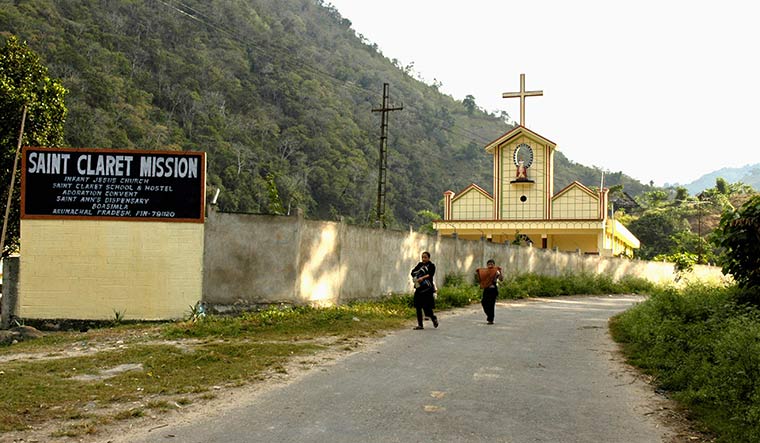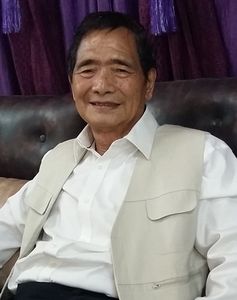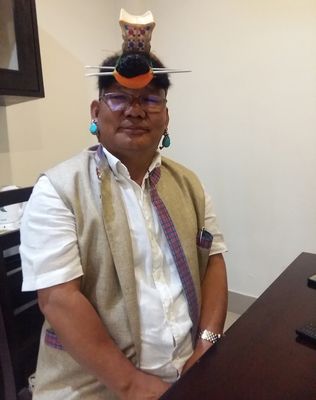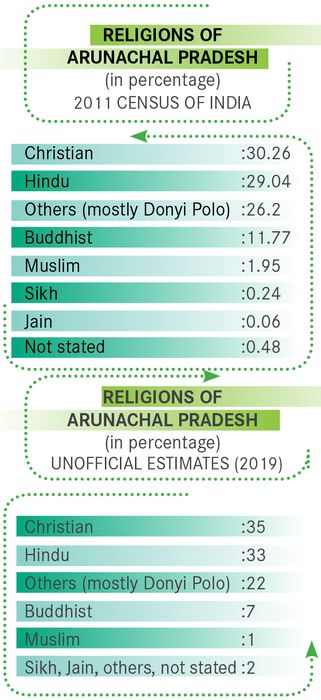ATOP A HILL overlooking Itanagar, lies the Centre for Buddhist Culture Gompa, which houses the city’s only Buddhist monastery. With its panoramic view and serene surroundings, the centre is a popular sightseeing spot. Thousands of prayer flags fluttered gently in the cool, northern breeze, while children ran around playing on the grounds. “People visit as tourists,” said the monastery's most senior lama. He had just stepped out of an empty prayer hall, after an hour of reading religious texts. “Few take the time to remove their shoes and enter the shrine to pray.”
There are only a handful of Buddhist monasteries left in Arunachal Pradesh, where 60 per cent of the population practised Buddhism until the 1960s; the remainder practised primitive tribal faiths. By the 1990s, the Buddhist population had fallen to 14 per cent and, by the 2011 Census of India, to 12 per cent. Today, Buddhism faces the threat of extinction. According to unofficial estimates, a mere 7 per cent of the state’s 14 lakh people are Buddhist.
“We are nowhere today,” said the lama. “Buddhism now exists only in a few towns like Tawang and Bomdila and some areas bordering Tibet.” Pointing downhill towards Itanagar, he said, “You will hardly find any Buddhists there. They have converted to other religions. Christianity is the booming religion. It attracts people with money, a good life and education. We are not here to prevent people from converting. That's not part of our religion.”
The 2011 census found Christianity to be the leading religion in Arunachal Pradesh, accounting for 30 per cent of the population. Since then, it has grown by at least 5 per cent. There are 36 denominations of Christianity in the state today.
“We lost 4 per cent of our followers to conversion in the past decade,” said Tsheri Gonpapa, president of the Arunachal Pradesh Buddhist Dharma Committee. “We are shaken.” Conversion went on unimpeded despite several visits to the state by the Tibetan spiritual leader the Dalai Lama. “Whether you bring the Dalai Lama or other Buddhist leaders here, it's not going to work,” said Gonpapa. “We cannot help our people with money like the Christians do. Also, we disapprove of polygamy and divorce, which are rampant in tribal life. So we are facing the heat.”
One of the key reasons for the decline of Buddhism is the state's diminishing association with Tibet. “Our religious teachings come from Tibet,” said Gonpapa. “China encourages us to visit Tibet and China, but India does not.” People of Arunachal Pradesh do not need visas to visit China or Tibet, but India insists that they take Chinese visas.
Recently, China expressed interest in starting trade with Arunachal Pradesh, but the offer was declined. “No way is it possible,” said Wangki Lowang, minister for public health engineering and water supply. “We will not allow Chinese investment in commerce or religion in Arunachal Pradesh. Even if the Central government is keen on it, we will oppose it.” When reminded that Myanmar, Bangladesh, Nepal and Bhutan have trade with some northeastern states and West Bengal, Lowang said: “Historically, these countries were part of India. China has never been part of India.”
Arunachal Pradesh, formerly NEFA (North-East Frontier Agency), was a political division of British India. After independence, the region became a bone of contention with China, so former prime minister Jawaharlal Nehru continued to keep it as an independent, protected area for the local tribes of China, Tibet, Thailand and Myanmar. In January 1972, it became the Union Territory of Arunachal Pradesh and in February 1987, a state.
“Nehru protected Arunachal Pradesh like the British did,” said former home minister Nyelam Taram, a member of the Baptist Church Council. “He did not permit outsiders to settle in NEFA, as he did not want to alter its religious and cultural fabric; nor did he want to antagonise China, as he knew its military strength. He was a farsighted man and protected Arunachal Pradesh as China wanted him to. But China breached that trust [which led to the 1962 India-China War].”
During the war, churches in the region sent their young, male followers to fight the Chinese at the border. “Our Christian boys shed their blood like the soldiers,” said Nyelam. Shortly after the war, the Bible was translated into the Nyishi dialect, and then into Apatani. Today, the Bible has been translated into 12 tribal dialects. “Once the Bible was translated into local languages, Christianity spread, and never looked back,” said Nyelam. “The Chinese tried every means of discouraging Christianity in Arunachal Pradesh, but we never gave them a chance to occupy the state, like they did to Tibet. We have severed our past ethnic and cultural links to Tibet. This has ensured the rapid growth of Christianity here. Thus, the war was a blessing in disguise for Christians.”
The decline of Buddhism initially coincided with the rise of Hinduism. Before the war, only 4 per cent of the population was Hindu. After the war, however, Hindus from the northeast began settling in NEFA, and tribals and Buddhists increasingly converted to Hinduism. In 2001, Christianity became the dominant religion.
There are more than 20 major tribal communities in Arunachal Pradesh, of which the Nyishi is the largest. The Nyishi, Tagin, Apatani, Adi and Galo tribes traditionally practised Donyi Polo, an indigenous, animistic religion that worships the sun and moon. In the past decade, however, they have increasingly converted to Christianity.
In 1978, Arunachal Pradesh prohibited “bribery or coercion for conversion.” If a person wishes to convert to another religion, it requires the district commissioner’s sanction. “It is alarming to note that among the several lakh conversions that took place in the past two decades, only a single person took permission,” said Gyati Rana, secretary of the Arunachal Vikas Parishad (AVP), an organisation affiliated to the RSS. Rana, who practises Donyi Polo, is from the Apatani tribe. The RSS has been trying to stanch flow of the tribe into Christianity. Rana said 25 per cent of the tribe had converted to Christianity in the past decade.
“In a few years, Christians will probably comprise more than 50 per cent of the state's population, as the church has accepted the tribal communities along with their customs,” said the reverend Changa Chippo, general secretary of the Baptist Church Council of Arunachal Pradesh. “We don't approve of many of their customs, but since these are age-old practices, our resistance will only anger the tribals,” said Chippo. “Hence, we are slowly educating them.”
The tribals have many regressive rituals, taboos, superstitions and cruel practices. Revenge killings are commonplace. Last rites can be gruesome, as some tribes cut the body into pieces and throw them in the river. Tarah Miri, general secretary of the Arunachal Christian Forum, said: “These traditions date back to our cultural and social links to Tibet and China. Through Christianity, we are ending them. However, I cannot forget that our Nyishi tribe originated in Tibet.” He was wearing a Tibetan headgear, which a Buddhist friend of his had given him. The friend had walked into Tibet illegally, after a month-long journey. Every year, many people from the state enter Tibet without visas, as the Line of Actual Control (LAC) is blurred and Indian troops have been unable to man the border efficiently.
According to Chippo, the increasing Christian population in Arunachal Pradesh has made China nervous. “Only 2 per cent of China's population is Christian,” said Chippo. “The Chinese are driving Christians out of their country. How will China tolerate the Christian majority in Arunachal Pradesh? It refers to this state as south Tibet, but none of the tribes following Christianity here will accept this.”
Miri said China was trying to promote Buddhism in Arunachal and build monasteries there. Gonpapa admitted that the Chinese had shown interest in building monasteries in the state. “But we will not allow it,” said Gonpapa.
Another key reason for conversion to Christianity is that churches have been helping the poor and the sick. “Prohibition of conversion will never work in Arunachal Pradesh,” said Chippo. “Here, people are oppressed and depressed. They come to churches for protection. We have taught them how to heal from disease and change age-old barbaric practices. Hence, they have adopted Christianity.”
Church leaders invite the local people to congregations that fast and pray for relief from illness. If fasting and prayers do not work, they are directed to hospitals run by the church, or the government. “The government hospitals never refuse patients referred by us,” said the reverend Likha Tech, a pastor at the Town Baptist Church in Nirjuli, a town in Papum Pare district. “Many miracles happen because of prayer and fasting, and people embrace our faith.”
At a church in Naharlagun, another town in Papum Pare district, parishioners stood on beautiful lawns, waiting for the service to begin. “I converted to Christianity after I fell ill,” said Toko Rebi, from the Nyishi tribe. “I had a constant stomach ache and kept vomiting. The pastor told me to go on a month-long fast. For the past six months, I have been praying. My vomiting has stopped and I am on the path to recovery.”
Tarah Sinda, former MLA, used to practise Donyi Polo. A few years ago, his wife was diagnosed with brain cancer. He took her to various hospitals for treatment, but to no avail. At a hospital in Hyderabad, doctors said that she had only a month to live. When they returned home, Sinda embraced Christianity. He said a miracle happened and his wife lived for almost a year. “She died two months ago,” said Sinda. “Later, my son, too, fell sick but has recovered after prayers at the church. The Donyi Polo faith never helped me.”
Churches of various denominations run 35 hospitals, four colleges and more than 100 schools in the state. Chippo denied that the church attracted the poor by doling out money. “There is no foreign influence in the churches here,” he said. “We don't take money from foreign Christian bodies.”
In a report sent to the government in 2015, the RSS said Christianity had permeated hard-to-access areas near the LAC. “Villagers in Pidi, Manigong, Tuting and Sarli, close to border, follow Christianity,” said an RSS member. “They have deserted their indigenous faiths and embraced Catholic or Baptist denominations, and churches have been set up in these villages.” He was part of an RSS delegation that walked over a few months to these far-flung villages. “We did not find security forces close to the border,” he said. “The last outpost was at least 25km away. We felt insecure.”
The large-scale conversions to Christianity have made Hindus nervous, though they are happy the conversions have weakened the state's connect with China and Tibet. “We are alarmed,” said Nibaran Manto, an RSS man in Itanagar. “We should not forget about what happened in Nagaland [the long-running insurgency] and the influence that Christianity had there.”
The RSS has a blueprint for spreading Hinduism in the state. The AVP has attracted a considerable number of Donyi Polo followers, propagating that Hinduism and Donyi Polo are part of the same creed, as both worship the sun and the moon. Virendra Dube, general secretary of the AVP, said that the RSS treated any religion that originated in India as sanatan dharma. “Donyi Polo exists only in India,” said Dube. “Even Buddhism was born in India. So it is part of our sanatan dharma. We don't put Christians and Muslims in the same bracket, though we are not opposed to their religions.”
Rana, however, disagreed. “I accept that I am part of the RSS, which considers Donyi Polo part of Hinduism,” said Rana. “It is also true that we read the vedas, since we do not have a religious text. But we are beef eaters and that will never change. In that sense, we are not worshippers of gow mata [sacred cow] and are not Hindu.”






